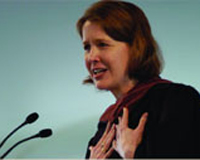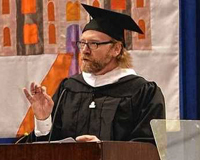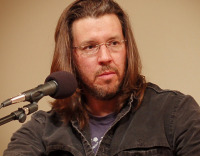Congratulations class of 2015!

Last week, eighty-five writers graduated from The Story Intensive Class of 2015. Today's post is in their honour.
These wonderful writers, from Nanaimo to Tasmania, have been showing up for their writing practice with us since September. This month, they each wrote and completed a brand new short story! Some of them finished a story for the first time ever; some for the first time in years; some for the hundredth time. (As you know, it doesn't really matter — there's a racket of resistance, no matter how many times you do it.)
One of this year's Story Intensive grads, Amanda, described the challenge of Story Is a State of Mind this way: it asks you to be courageous enough to be an absolute beginner and to be great writer, at the same time.
Courage is the operative word here.
Courage! Feeling afraid and doing the thing anyway. Every one of this year's graduates showed up to write before they knew what they were going to write. They said no thank you to distractions, and protected their writing time, even when it was very inconvenient. They finished something, and showed it to their peers without knowing for sure if it was any good.
You know how life has a way of "getting your attention" as soon as you commit to doing something important for yourself? Well, our graduates saw a lot of that this year. They wrote even though they were on the road, moving across the country, parenting young children, changing jobs, caring for ageing parents, or experiencing illnesses.
Their stories are inspiring and, quite frankly, humbling. Any time I felt my own resistance coming up, I would think of this beautiful net of writers out there who were doing The Story Intensive, and I would feel bolstered by their company.
Congratulations are in order!
To celebrate The Story Intensive Class of 2015, I'm sharing some of my favourite commencement addresses, below.
Happy holidays, everybody.
xo,

ps. You know that amazing person in your life who is part magic? Your godmother, your best friend, your daughter, your incredible uncle? You can totally give him Story Is a State of Mind this year! Recipients can do the course whenever they want: there's no fixed start date. They get lifelong access. And they can enrol in the next The Story Intensive for a discounted rate. Buy it as a gift!
What Now?
Ann Patchett
 The answer to the question What now is never what you think it's going to be, and that is the thing that every writer has to learn. I came to understand that fiction writing was like duck hunting. You go to the right place at the right time with the right dog. You get into the water before dark, wearing a little protective gear, stand behind some reeds and wait for the story to present itself. This is not to say you are passive. You choose the place and the day. You pick the gun and the dog. You have the desire to blow the duck apart for reasons that are entirely your own. But you have to be willing to accept not what you wanted to happen, but what happens. You have to write the story you find in the circumstances you've created, because more often than not the ducks don't show up. The hunters in the next blind begin to argue and you realize they're in love. You see a snake swimming in your direction. Your dog begins to shiver and whine and you start to think about this gun that belonged to your father. By the time you get out of the marsh you will have written a novel that is so devoid of ducks it will shock you. It took me a long time of standing still and being quiet to figure out what in retrospect appears to be a pretty simple lesson: writing a novel and living a life are very much the same thing. The secret is finding the balance between going out to get what you want and being open to the thing that actually comes your way.
The answer to the question What now is never what you think it's going to be, and that is the thing that every writer has to learn. I came to understand that fiction writing was like duck hunting. You go to the right place at the right time with the right dog. You get into the water before dark, wearing a little protective gear, stand behind some reeds and wait for the story to present itself. This is not to say you are passive. You choose the place and the day. You pick the gun and the dog. You have the desire to blow the duck apart for reasons that are entirely your own. But you have to be willing to accept not what you wanted to happen, but what happens. You have to write the story you find in the circumstances you've created, because more often than not the ducks don't show up. The hunters in the next blind begin to argue and you realize they're in love. You see a snake swimming in your direction. Your dog begins to shiver and whine and you start to think about this gun that belonged to your father. By the time you get out of the marsh you will have written a novel that is so devoid of ducks it will shock you. It took me a long time of standing still and being quiet to figure out what in retrospect appears to be a pretty simple lesson: writing a novel and living a life are very much the same thing. The secret is finding the balance between going out to get what you want and being open to the thing that actually comes your way.
The Importance of Kindness
George Saunders
 It’s a little facile, maybe, and certainly hard to implement, but I’d say, as a goal in life, you could do worse than: Try to be kinder.
It’s a little facile, maybe, and certainly hard to implement, but I’d say, as a goal in life, you could do worse than: Try to be kinder.
Now, the million-dollar question: What’s our problem? Why aren’t we kinder?
Here’s what I think: Each of us is born with a series of built-in confusions that are probably somehow Darwinian. These are: (1) we’re central to the universe (that is, our personal story is the main and most interesting story, the only story, really); (2) we’re separate from the universe (there’s US and then, out there, all that other junk – dogs and swing-sets, and the State of Nebraska and low-hanging clouds and, you know, other people), and (3) we’re permanent (death is real, o.k., sure – for you, but not for me).
Now, we don’t really believe these things — intellectually we know better — but we believe them viscerally, and live by them, and they cause us to prioritize our own needs over the needs of others, even though what we really want, in our hearts, is to be less selfish, more aware of what’s actually happening in the present moment, more open, and more loving.
So, the second million-dollar question: How might we do this? How might we become more loving, more open, less selfish, more present, less delusional, etc., etc? (
Go here to read his full address.)
This is Water
David Foster Wallace
 As I'm sure you guys know by now, it is extremely difficult to stay alert and attentive, instead of getting hypnotized by the constant monologue inside your own head (may be happening right now). Twenty years after my own graduation, I have come gradually to understand that the liberal arts cliché about teaching you how to think is actually shorthand for a much deeper, more serious idea: learning how to think really means learning how to exercise some control over how and what you think.
As I'm sure you guys know by now, it is extremely difficult to stay alert and attentive, instead of getting hypnotized by the constant monologue inside your own head (may be happening right now). Twenty years after my own graduation, I have come gradually to understand that the liberal arts cliché about teaching you how to think is actually shorthand for a much deeper, more serious idea: learning how to think really means learning how to exercise some control over how and what you think.
It means being conscious and aware enough to choose what you pay attention to and to choose how you construct meaning from experience. Because if you cannot exercise this kind of choice in adult life, you will be totally hosed. Think of the old cliché about "the mind being an excellent servant but a terrible master".
(Go here to listen to the address in full.)

1 comment
Leave a comment